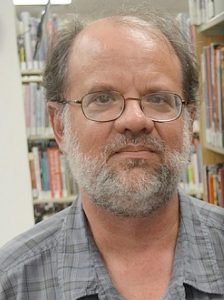 Spencer (Musical Theatre Writer’s Survival Guide) is not only an award-winning composer/lyricist but also a lifelong fan of novelizations and tie-in books. “Media tie-in writing is literature. Real literature,” he persuasively argues in this massive and affectionate history of novelizations. Screenplay novelizations of silent films began appearing in 1915, decades after stage play novelizations. Far from hack writers, among the notables who wrote novelizations are Pulitzer Prize winner Upton Sinclair (who novelized the play Damaged Goods in 1913); National Book Award winner Paul Monette who penned tie-ins for Werner Herzog’s Nosferatu and Brian De Palma’s Scarface; and Isaac Asimov, who novelized Fantastic Voyage. This is a fascinating history of the shockingly prolific writers who published books under various names. Spencer also conducts illuminating interviews with tie-in veterans John Peel, Martin Noble, and Linda Stewart (who wrote the novelization of Absence of Malice without a finished screenplay). There are also chapter-long appreciations and career overviews of William Johnston, Michael Avallone (writing countless novelizations, ranging from Sam Fuller’s Shock Corridor to Beneath the Planet of the Apes), and others.
Spencer (Musical Theatre Writer’s Survival Guide) is not only an award-winning composer/lyricist but also a lifelong fan of novelizations and tie-in books. “Media tie-in writing is literature. Real literature,” he persuasively argues in this massive and affectionate history of novelizations. Screenplay novelizations of silent films began appearing in 1915, decades after stage play novelizations. Far from hack writers, among the notables who wrote novelizations are Pulitzer Prize winner Upton Sinclair (who novelized the play Damaged Goods in 1913); National Book Award winner Paul Monette who penned tie-ins for Werner Herzog’s Nosferatu and Brian De Palma’s Scarface; and Isaac Asimov, who novelized Fantastic Voyage. This is a fascinating history of the shockingly prolific writers who published books under various names. Spencer also conducts illuminating interviews with tie-in veterans John Peel, Martin Noble, and Linda Stewart (who wrote the novelization of Absence of Malice without a finished screenplay). There are also chapter-long appreciations and career overviews of William Johnston, Michael Avallone (writing countless novelizations, ranging from Sam Fuller’s Shock Corridor to Beneath the Planet of the Apes), and others. VERDICT Packed with photos, this is the perfect reference tool for the publishing genre that launched many lifetime readers.
—LIBRARY JOURNAL (Kevin Howell)
 “David Spencer is well-known among authors as the leading expert on tie-in novel history. His encyclopedic knowledge of this unjustly, routinely overlooked publishing niche is detailed, varied, and quite simply unmatched. Now he’s written the definitive book on the subject, one that’s as entertaining (and surprisingly, unabashedly personal) as it is deeply informative. It’s not just the scholarship and research that’s stunning, but his obvious, enduring affection for the genre, one that consistently produces scores of bestsellers that millions of readers like him love, but that publishers, while appreciating the profits, inexplicably view with disdain…and that the media virtually ignores. His insightful book, which he appropriately and cleverly calls a ‘cultural autobiography,’ is an important milestone in memorializing the history and richness of tie-in novels for future generations. Let’s hope this is just the first volume of many more to come from him that will explore the field—its history, its future, and its authors.”
“David Spencer is well-known among authors as the leading expert on tie-in novel history. His encyclopedic knowledge of this unjustly, routinely overlooked publishing niche is detailed, varied, and quite simply unmatched. Now he’s written the definitive book on the subject, one that’s as entertaining (and surprisingly, unabashedly personal) as it is deeply informative. It’s not just the scholarship and research that’s stunning, but his obvious, enduring affection for the genre, one that consistently produces scores of bestsellers that millions of readers like him love, but that publishers, while appreciating the profits, inexplicably view with disdain…and that the media virtually ignores. His insightful book, which he appropriately and cleverly calls a ‘cultural autobiography,’ is an important milestone in memorializing the history and richness of tie-in novels for future generations. Let’s hope this is just the first volume of many more to come from him that will explore the field—its history, its future, and its authors.”
—LEE GOLDBERG
#1 New York Times bestselling author,
co-founder of the International Association of Media Tie-In Writers
 “If you knew that Thomas Disch did the novelizations of the films Alfred the Great and Sunflower, that John Jakes novelized a Planet of the Apes story, that Murray Leinster novelized the 1950 western Dallas (under his real name, Will F. Jenkins), that Frederik Pohl novelized the 1957 film Edge of the City, and that in addition to novelizing Voyage to the Bottom of the Sea, Theodore Sturgeon also novelized a couple of westerns (The King and Four Queens, 1956, and The Rare Breed, 1966), you probably want this book. If you didn’t know that female novelizers have been around since Arline de Haas novelized The Jazz Singer (yes, the original one), you definitely need this book.
“If you knew that Thomas Disch did the novelizations of the films Alfred the Great and Sunflower, that John Jakes novelized a Planet of the Apes story, that Murray Leinster novelized the 1950 western Dallas (under his real name, Will F. Jenkins), that Frederik Pohl novelized the 1957 film Edge of the City, and that in addition to novelizing Voyage to the Bottom of the Sea, Theodore Sturgeon also novelized a couple of westerns (The King and Four Queens, 1956, and The Rare Breed, 1966), you probably want this book. If you didn’t know that female novelizers have been around since Arline de Haas novelized The Jazz Singer (yes, the original one), you definitely need this book.
For an oft-marginalized branch of literature, book adaptations of films have quite a history, of which most of us are unaware. David Spencer rectifies that omission with his deeply researched, frequently amusing, and well-written book, The Novelizers. For those who find novelizations entertaining and valuable for how they expand on famous (and sometimes not so famous) films and television shows, this tome will be a treasure. For those unfamiliar with the genre or uncertain of its value, it will be an eye-opener.”
—ALAN DEAN FOSTER
New York Times bestselling science fiction novelist
and worldwide bestselling novelizer (Star Wars, Alien, Star Trek, etc.)
 “If they were ever to put me on trial for my crimes against literature in the name of tie-in writing I’d want David Spencer on my defense team. Hell, he’d be my entire defense, because there isn’t a person alive who knows more about this stuff, or the love that goes into it from a writer’s perspective. The Novelizers is the book only he could write—and I’m thrilled he has. The sheer scope of history and knowledge of our craft on display here is dizzying and humbling. It’s not often you hold a book in your hand and think this is it, the definitive text on the field, but that is exactly what this is, and it is compiled with so much love and respect for those writers who helped us fall in love with those shows and movies in a whole new way. It’s beautiful. A genuine treasure.”
“If they were ever to put me on trial for my crimes against literature in the name of tie-in writing I’d want David Spencer on my defense team. Hell, he’d be my entire defense, because there isn’t a person alive who knows more about this stuff, or the love that goes into it from a writer’s perspective. The Novelizers is the book only he could write—and I’m thrilled he has. The sheer scope of history and knowledge of our craft on display here is dizzying and humbling. It’s not often you hold a book in your hand and think this is it, the definitive text on the field, but that is exactly what this is, and it is compiled with so much love and respect for those writers who helped us fall in love with those shows and movies in a whole new way. It’s beautiful. A genuine treasure.”
—STEVEN SAVILE
Internationally bestselling multi-genre and tie-in novelist
 “I’m convinced that nobody knows more about movie and TV tie-in novels and novelizations than David Spencer. He demonstrates that in The Novelizers, a volume that’s well-written, packed with information, and above all entertaining. As someone who bought and read many of the books Spencer writes about when they were new, I thoroughly enjoyed revisiting those wonderful days.”
“I’m convinced that nobody knows more about movie and TV tie-in novels and novelizations than David Spencer. He demonstrates that in The Novelizers, a volume that’s well-written, packed with information, and above all entertaining. As someone who bought and read many of the books Spencer writes about when they were new, I thoroughly enjoyed revisiting those wonderful days.”
—JAMES REASONER
NY Times and Publishers Weekly bestselling
author of the Outlaw Ranger seriesand the trio of
original tie-ins based on Walker: Texas Ranger
 “An astonishing look at the enormously popular—though frequently derided—field of tie-in fiction: original novels based on TV shows and movie novelizations—in particular unearthing the little-known beginnings of the craft going back to silent movie days and delving into the vast number of examples of the British bent for such books. The Novelizers is a banquet waiting for anyone who cares about popular culture to dig in.”
“An astonishing look at the enormously popular—though frequently derided—field of tie-in fiction: original novels based on TV shows and movie novelizations—in particular unearthing the little-known beginnings of the craft going back to silent movie days and delving into the vast number of examples of the British bent for such books. The Novelizers is a banquet waiting for anyone who cares about popular culture to dig in.”
—MAX ALLAN COLLINS
NY Times bestselling and Edgar-Award-winning author and prolific tie-in novelist
 “I’m not familiar with most of the source material in this book, but I still enjoyed it for all the detailed information I’d never seen anywhere else. I also learned a lot about writing. While discussing the little-known history of novels adapted from TV shows, the author also explores the relationship between form and function in different story-telling media. For writers, readers and tv watchers, it’s a valuable and inspiring meditation on the ways we tell stories and how good adaptations are more than translations; they are new creations.”
“I’m not familiar with most of the source material in this book, but I still enjoyed it for all the detailed information I’d never seen anywhere else. I also learned a lot about writing. While discussing the little-known history of novels adapted from TV shows, the author also explores the relationship between form and function in different story-telling media. For writers, readers and tv watchers, it’s a valuable and inspiring meditation on the ways we tell stories and how good adaptations are more than translations; they are new creations.”
—ELIZABETH DEWBERRY
Acclaimed novelist, author of His Lovely Wife (Harcourt), Sacrament of Lies
(Putnam), Break the Heart of Me (Doubleday), and Many Things Have Happened
Since He Died (Doubleday)
 “I have just finished reading The Novelizers, down to the last endnote—and what a joy! David Spencer has done his subject proud. Not only does the book evoke startling, long-buried memories of reading novelizations by Michael Avallone, William Johnston, and James Blish (or what I THOUGHT was Blish; Spencer knows better!), but it introduced me to a much larger world of novelizations of which I was largely unaware. I can’t imagine a better guide to that world.”
“I have just finished reading The Novelizers, down to the last endnote—and what a joy! David Spencer has done his subject proud. Not only does the book evoke startling, long-buried memories of reading novelizations by Michael Avallone, William Johnston, and James Blish (or what I THOUGHT was Blish; Spencer knows better!), but it introduced me to a much larger world of novelizations of which I was largely unaware. I can’t imagine a better guide to that world.”
—JACK LECHNER
Executive Film Producer (Blue Valentine, The Fog of War).
TV Producer, musical theatre lyricist,
Film Chair and Associate Professor,
Columbia School of the Arts

“David Spencer’s The Novelizers was a wild ride through a new world for me, the broad history of movie and television ‘tie-in’ books or novelizations. Spencer’s deeply researched and always entertaining descriptions of the novelizations themselves (and the writers—you get the details of the good, the great and the odd) made the entire read addictive and wholly enjoyable. And the ongoing discussion about the thorny issues of adapting visual narratives into prose is without a doubt worth the price of admission for writers of all stripes. Terrific, terrific, terrific.”
—MARY LIZ McNAMARA
—MARY LIZ McNAMARA
Award-winning theatre composer-lyricist-librettist

“Readers of my historical novels know that I’m attracted to subjects that have often been overlooked by others. David Spencer has done something comparable in The Novelizers, shedding light on a largely neglected and sometimes maligned part of literary and cinematic history: the movie and television tie-in book. Spencer has done an extraordinary amount of primary research, chronicling the genre’s beginning in the age of silent movies, through the boom years of the 1950s-1960s, and up to the present day. Well-known and respected authors like Thomas M. Disch, Jim Thompson, Irving Shulman, Theodore Sturgeon, John Jakes, Vonda M. McIntyre, and Walter Gibson wrote novelizations either pseudonymously or under their own names; but Spencer doesn’t neglect the lesser known writers like William Johnston, Leonore Fleischer, and Michael Avallone, who labored regularly in the genre. But Spencer does more than just list names: he’s taken the time to read these books and discusses the ways in which the novelizers changed and improved the scripts they were given to adapt. Most of all, The Novelizers is a terrific read, one I heartily recommend.”
—ALAN BRENNERT
Bestselling novelist (Moloka’i, Honolulu, Palisades Park)
and
TV Dramatist (‘80s Twilight Zone, L.A. Law)

“True to brand, David Spencer once again dives into a niche market for which little to no literature exists and explodes it from the inside out. Every page is researched to 11, with stories, images and most importantly context. What a gift this book is, to anyone who ever enjoyed the novelization of a pre-existing property. Which is everybody.”
—TIMOTHY HUANG
Prize-winning composer-lyricist-librettist
(Peter and the Wall, American Morning)

“The Novelizers, by David Spencer, is a marvel. First, it is entirely unique: a combination of anthology, pictography, and guided tour across more than a century of American media. Beginning with the silent movie era, advancing chronologically through the present day, Spencer surveys the vast catalogue of “tie-in” paperbacks created to help market movies, television shows, and musicals.
His passion, reverence and respect for this art form pulses on every page. What is genius about Spencer’s book is he celebrates the authors, how they came to write these tie-ins, and how their adaptations differ from the original source. Forgotten authors such as Eustace Hale Ball, who died in 1931 and was one of the founding fathers of the novelization industry, stare out at us in a vividly restored photo that looks as if it were taken yesterday. Below, there’s an excerpt of Ball’s writing with Spencer’s sharp analysis of it.
Spencer asserts that many of these tie-in writers were (and continue to be) master wordsmiths—in adaptation, enhancing the source scripts, adding scenes and providing rich interior lives for the characters; and in original novels based on TV series, “owning” their borrowed universes with styles as iconic as the shows themselves. These practitioners range from classic American authors like Upton Sinclair of the early 20th century to ubiquitous ‘60s pulpmeister, Michael Avallone, whose paperback tie-ins would influence generations of writers to follow.
Spencer has tracked down and interviewed some of the great tie-in writers who are still with us, such as Linda Stewart of NYC and Martin Noble of Oxford, England. Their tales of how their novelizations came to be written are fascinating, and provide delightful first-hand accounts of technique, approach and the occasional byplay over final draft at the intersection of showbiz and publishing—not only in the US but the UK […]
Spencer’s writing is crisp, clear and humorous. He brings his readers close, and there is a sense of being led through a museum by a very smart professor. He includes many excepts, and analyzes their style and content. In one chapter, side by side, he compares different novelizations of the same source. No wonder the International Association of Media Tie-in Writers (IAMTW) dubbed Spencer its ‘Historian General.’
The Novelizers isn’t only about media tie-ins per se: it’s a mirror reflecting back on the vast number of sources that inspired them through the ages, even unto the present day. More than a niche book, it’s a panoramic view of our changing society and culture that belongs in every library and on every coffee table. So make some popcorn, get your copy and enjoy.”
—ALISON HUBBARD
Award-winning theatre lyricist and author of
the bestselling true crime novel, The Kelsey Outrage

(Podcast transcript): “Today I’m going to talk about TV and film tie-in fiction because I’m reading [an ebook edition of] The Novelizers by David Spencer (which you can get in hardback and paperback too). It’s a huge, compendious history of the tie-in fiction world, its brilliant title referring both to people who adapt screenplays to novel length fiction and people who write tie-in fiction taking the characters from TV and films and making original stories from them. And in the introduction, which is autobiographical and quite brilliant, David Spencer makes a good case for the artistry of this kind of work, despite how it’s usually looked at quite sniffly and disdainfully by all kinds of people in publishing, in the book world; yet of course [novelizing is] a long and honorable tradition, as he goes on to prove: almost 100 years of people writing versions of stuff that we see on the screen and delivering it straight into our heads through the medium of the printed page.
I’ve known lots of novelizers—and I am an occasional novelizer—and some of the nicest people I know in publishing work in that world; and there’s a great camaraderie. They are, a lot of the time, fans of the things they work on. That’s not to say that what they produce is fan-fiction, because they have so much responsibility to the people they’re working for and the people they’re writing for, to get it right. There are lots of invisible rules to this kind of writing.
[…] There’s chapters on all sorts of [sub-topics]—and hidden histories! That’s what I’m really interested in. It’s like reading something from the Third Wave of Feminism in the ‘70s, ‘80s; or gay/queer fiction through the ages, where you [encounter] these untold histories of people really ‘working at the cold face.’ Or pulp fiction [history …] where you learn all about people who wrote lots of pulp fiction in ‘50s, ‘60s, ’70s—usually uncelebrated but making their way; [writers] the unkinder world might call “hacks” because they have to turn out the pages every day and every week [and] don’t get to dick around as much as the more literary authors do…”
—PAUL MAGRS
Bestselling science fiction and Doctor Who tie-in novelist

“Meticulously researched and beautifully written, David Spencer’s The Novelizers pays affectionate tribute to the talented, unheralded authors who adapted popular films and television series/specials into novelization form. It’s a revelation to uncover these superb writers whose ‘tie-in’ writing reinvigorated, reinvented, and occasionally eclipsed their source material. Spencer not only gives us an historical context for the application of their trade but also includes generous proof of their prose. Guy Fowler, Leonore Fleischer, and Stuart James may not be household names, but under Spencer’s respectful eye, they deserve to be. Original cover art faithfully replicated within The Novelizers’ covers also makes this book aesthetically exciting. Fascinating and hugely entertaining, The Novelizers gives its subjects their rightful literary place in the sun.”
—DOUGLAS J. COHEN
Award-winning musical theatre composer-lyricist-librettist
(No Way to Treat a Lady, The Gig) and author of How to Survive a Killer Musica

“When I was young and loved movie musicals such as West Side Story or My Fair Lady or Thoroughly Modern Millie, I was thrilled to find that there were novels. I was confused at that early age and thought that the film were based on those novels. I had never heard the word “novelization.” But that is what they were. How else would I ever know that Millie Dilmont (Julie Andrews) was from Topeka, Kansas (even though Julie never traded her British accent in for a Kansas drawl) if it weren’t for those novelizations. Now, David Spencer has written a whole book about a genre I hardly knew existed. And how passionate he is about each and every novelization he covers. The book has taken a long time to read because it has made me look us the books within the book. The photos and the details are extraordinary and it will always sit as a work of reference, never to be equaled, on my shelf. […] The Novelizers is a delicious and complete history of a genre of books that are better than anyone thought they were.”
—STEPHEN COLE
Award-winning musical theatre lyricist-librettist,
and author of the bestselling backstage novel Mary and Ethel…and Mikey Who?

“I just finished reading David Spencer’s The Novelizers. This is one of those books that—once you’ve read it—you realize that the world has desperately needed an in-depth book on this subject for years. It’s about darn time someone wrote it.
David Spencer has written more than just a cultural history about novelizations and tie-in novels. He also includes critical analysis, comparisons of different versions of film novelizations (UK vs US versions), and biographies of key authors. He defends this form of literature AS legitimate literature. For instance, he often provides excerpts from novels, then follows this by specifically pointing out word choices, sentence structure, how information is imparted, etc, to bring home just how skillfully the writers are telling these stories and imparting themes/ambiance/etc. Anyone critical of novelizations or media tie-ins as ‘hack’ work would have a hard time defending that position after reading The Novelizers.
The many illustrations (primarily photos of the authors and many, many wonderful book covers) and the history of art form are fascinating by themselves, but it’s really Spencer’s examination of the art of the craft–his intelligent and clear examination of why the best novelizations make great stories—that makes this book so invaluable. It is a tribute to a true art form that has often been unfairly criticized or marginalized.”
—TIM DeFOREST
Author and pop culture historian

“Like many of us—especially those of us who grew up in the 60s & 70s—I read movie tie-in paperbacks as a kid. I didn’t go out of my way to read them, necessarily; I basically read whatever fell into my hands […] I no longer have copies of any of those books […] In fact, tie-ins in general, it would seem, fell off my radar after the 70s, and I’d never wondered why.
Turns out that there’s a logical explanation for that, as I learned from David Spencer’s fascinating passion project The Novelizers, which shines a light on, and enthusiastically champions, this often overlooked, sometimes downright dismissed avenue of literary endeavor—i.e., the “translation” of a movie, TV series or stage work (etc.) into an equivalent, novelistic reading experience—while giving due credit to the able, often-brilliant prose stylists who contributed to it, some of whom were incredibly prolific.
Spencer was obsessed specifically with tie-in books at an age when I would read one only if I happened to come across it. Entire chapters are devoted to four of the tie-in writers most dear to Spencer’s heart: Stuart James; Michael Avallone; Linda Stewart […] and, finally, William Johnston (one of the above-mentioned “incredibly prolific” ones […])
So, what’s the reason that the tie-in wave crested then subsided in the early-80s, not just for me but (as it turns out) the culture as a whole? Home video. Tie-in books could be like a souvenir of a movie or TV show (or even stage show!) one loved, when there was no other way to own it, if you will. Or else it could be a way to experience it—at least in the case of movies or stage shows—when doing so in any other way was logistically impossible. When home video came along, one could suddenly “own” these things in their original form, which obviously made reading them, which is simply a different experience, the less desirable. But Spencer, throughout the book, advocates embracing that difference, because as often as not, in the hands of these authors, the version on the page may well be better than the one on the stage (or screen).
I oughta read more of those tie-ins, frankly, and if any of the above piques your interest, you oughta read this book.”